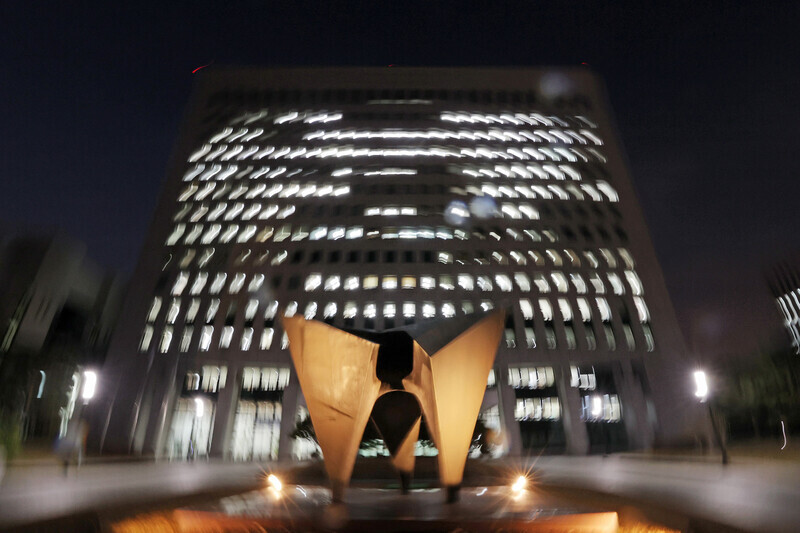hankyoreh
Links to other country sites 다른 나라 사이트 링크
[Editorial] Allegations of prosecutors surveilling judges need to be clarified immediately

One of the alleged irregularities cited by South Korean Justice Minister Choo Mi-ae as grounds for ordering the suspension of Prosecutor General Yoon Seok-youl was illegal surveillance of judges, which has set off a fierce controversy. If it’s true, as Choo claims, that the prosecutors have been collecting personal information about judges in major cases, including information about their political orientation, that’s certainly a serious matter.
But since we have yet to determine exactly what was in the report drafted by the prosecutors, why it was composed, or how it was used, the allegation has aroused a range of speculation and controversy. Given the nature of the affair and the interest of the public, we need to quickly get to the bottom of this.
A prosecutor involved in drafting the report offered a rebuttal in a post on the prosecutors’ internal message board on Nov. 25. “The document was prepared as reference material for helping the prosecutors get a conviction, and it was only provided to the anti-corruption division and the public investigation department, which are the responsible departments. The information collected was found through searches of portal sites and publicly available information, including news articles,” the prosecutor said.
This prosecutor also offered an explanation about the alleged use of a list of “controversial judges” that was composed to manage the judiciary under the leadership of former Chief Justice Yang Sung-tae. “One of the judges trying a case about the abuse of judicial and administration authority was on the list. The prosecutors in charge of the case were already aware of that, but we included that as a reminder.” In short, this prosecutor said that no illegality occurred.
But judges have objected that the collection and utilization of such information could damage the impartiality of trials. In a post on the judiciary’s internal message board, one senior judge asked the National Court Administration to take stern action. “The prosecutors ought to be making their case based on the evidence. But apparently, they were trying to exploit judges’ ideological leanings to produce a guilty verdict, which sounds like manipulation of the court,” the judge said.
Other issues that raise suspicions about the prosecutors’ intentions are the fact that the report was drafted and shared not by the prosecutor in charge of the case but through a concerted effort by the Supreme Prosecutors’ Office (SPO), and the fact that the department that received this report was in charge of internal audits and even criminal investigations.
In the end, the question of whether illegal surveillance occurred depends on whether the information collected about the judges was part of prosecutors’ ordinary work, whether it was collected through legal methods and within the scope of the law, and whether that information had an inappropriate impact on the trials.
Those are presumably the questions that the SPO’s audit team was trying to answer when it raided the SPO’s investigative intelligence policy office, which produced the report. While that raid ought to have happened before Choo made her announcement, it remains true that there needs to be a thorough accounting of the facts.
While the ruling and opposition parties are rushing to call for parliamentary audits either into Yoon or Choo, there will be plenty of time to make such a call after reviewing the results of the audit.
Please direct comments or questions to [english@hani.co.kr]

Editorial・opinion
![[Editorial] Penalties for airing allegations against Korea’s first lady endanger free press [Editorial] Penalties for airing allegations against Korea’s first lady endanger free press](https://flexible.img.hani.co.kr/flexible/normal/500/300/imgdb/original/2024/0502/1817146398095106.jpg) [Editorial] Penalties for airing allegations against Korea’s first lady endanger free press
[Editorial] Penalties for airing allegations against Korea’s first lady endanger free press![[Editorial] Yoon must halt procurement of SM-3 interceptor missiles [Editorial] Yoon must halt procurement of SM-3 interceptor missiles](https://flexible.img.hani.co.kr/flexible/normal/500/300/imgdb/child/2024/0501/17145495551605_1717145495195344.jpg) [Editorial] Yoon must halt procurement of SM-3 interceptor missiles
[Editorial] Yoon must halt procurement of SM-3 interceptor missiles- [Guest essay] Maybe Korea’s rapid population decline is an opportunity, not a crisis
- [Column] Can Yoon steer diplomacy with Russia, China back on track?
- [Column] Season 2 of special prosecutor probe may be coming to Korea soon
- [Column] Park Geun-hye déjà vu in Yoon Suk-yeol
- [Editorial] New weight of N. Korea’s nuclear threats makes dialogue all the more urgent
- [Guest essay] The real reason Korea’s new right wants to dub Rhee a founding father
- [Column] ‘Choson’: Is it time we start referring to N. Korea in its own terms?
- [Editorial] Japan’s rewriting of history with Korea has gone too far
Most viewed articles
- 160% of young Koreans see no need to have kids after marriage
- 2Presidential office warns of veto in response to opposition passing special counsel probe act
- 3Months and months of overdue wages are pushing migrant workers in Korea into debt
- 4Hybe-Ador dispute shines light on pervasive issues behind K-pop’s tidy facade
- 5Japan says it’s not pressuring Naver to sell Line, but Korean insiders say otherwise
- 6[Reporter’s notebook] In Min’s world, she’s the artist — and NewJeans is her art
- 7[Editorial] Penalties for airing allegations against Korea’s first lady endanger free press
- 8Inside the law for a special counsel probe over a Korean Marine’s death
- 9OECD upgrades Korea’s growth forecast from 2.2% to 2.6%
- 10[Exclusive] Hanshin University deported 22 Uzbeks in manner that felt like abduction, students say